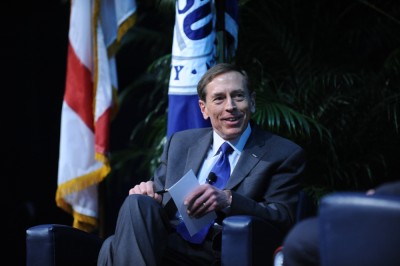NSU Newsroom
SharkBytes
Horizons
This version of NSU News has been archived as of February 28, 2019. To search through archived articles, visit nova.edu/search. To access the new version of NSU News, visit news.nova.edu.
This version of SharkBytes has been archived as of February 28, 2019. To search through archived articles, visit nova.edu/search. To access the new version of SharkBytes, visit sharkbytes.nova.edu.
Retired U.S. Army General David H. Petraeus Speaks at NSU, Reflects on 37 Years of Service
More than 800 members of the NSU community congregated in the Arena at the Don Taft University Center on Feb. 6, to hear from retired U.S. Army General David H. Petraeus, Ph.D., whose military career spanned 37 years.
Petraeus reflected on his time as a commander in Iraq and Afghanistan; discussed his most recent role as CIA director; and commented on current issues impacting soldiers, veterans, and security in America and abroad.
The four-star general is perhaps most known for overseeing the U.S. Army’s preparation of leaders and units for deployment to Iraq and Afghanistan, including guiding the development of the Army/Marine Corps field manual on counterinsurgency.
“I knew I had become the face of the surge, [but] it wasn’t something I sought out,” Petraeus said during the Distinguished Speakers Series event, hosted by NSU’s Farquhar College of Arts and Sciences. Petraeus spoke candidly throughout the conversation-style interview led by Gary Gershman, J.D., Ph.D., professor at the college.
Petraeus emphasized that crucial to any success he achieved was “the surge of ideas.” He focused on the notion that the most effective strategy was one that evolved and enabled American forces to build a real connection with the local populations. An important goal was to determine “which insurgents could be reconciled; which could become part of the solution rather than the problem,” he said.
But that proved no easy task. Even away from the front lines, Petraeus faced several challenges, such as balancing conflicting opinions among civilian and military leadership on the best plans for battle.
“I am going to give [the President] my best professional military advice,” Petraeus said, acknowledging the political pressures faced by the U.S. commander-in-chief. “If you choose not to accept it, I will fully support that decision. But I won’t change my recommendation.”
Petraeus also commented on the great burden of sending troops to war, knowing first-hand the severity of combat and the sacrifices made by those who serve.
“We want to avoid boots on the ground. And, that’s a great concept—except when it’s not. The craft is determining where you need boots on the ground.”
When asked what he sees as his legacy, Petraeus admitted he hasn’t given the concept much thought.
“I guess I’d like [to be known as] someone who’s constantly trying to learn … changing the big ideas … always having the attitude that if you could do 20 pull-ups, you could do 21. If I were to write a book, I would title it Relentless.”
Following the interview, Petraeus led a Q&A session with audience members, which included questions and comments from several U.S. veterans. Prior to the evening’s events, Petraeus met with undergraduate students from the college in a special seminar.
